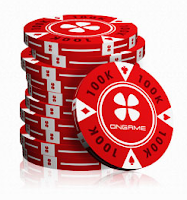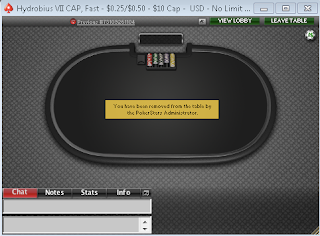On Occupy PokerStars and Other Protests
 Have been somewhat intrigued by all the hubbub surrounding PokerStars’ change to a weighted-contributed model of attributing rake instituted on January 1. The ones griping about the change have made the most noise, it seems. Meanwhile, those with less of an issue with it have been relatively less conspicuous, though perhaps more persuasive.
Have been somewhat intrigued by all the hubbub surrounding PokerStars’ change to a weighted-contributed model of attributing rake instituted on January 1. The ones griping about the change have made the most noise, it seems. Meanwhile, those with less of an issue with it have been relatively less conspicuous, though perhaps more persuasive.I’m one of those recreational players who despite playing a lot of online poker never really got heavily into taking advantage of things like rakeback or other promotions sites offer to reward high frequency players. While PokerStars didn’t offer rakeback, anyway, its “VIP Stellar Rewards” program was a way for even small-timers like me to earn a few bonuses along the way. So I became somewhat familiar with it until last April when I had to leave the site with the rest of the Americans.
I played a lot more on PokerStars than Full Tilt Poker over the years, preferring the site for a variety of reasons. So I ultimately earned a lot more extras on Stars than I did on Tilt, including numerous cash bonuses. I think the only extra I ever got from FTP was to purchase an international power converter with my FTP points once. Meanwhile, I never did figure out FTP’s “Black Card” program or “Iron Man” program or any of the rest.
All of which is to say, I’d never really given a ton of thought to how rake was attributed on the various sites. I knew that my Frequent Player Points (FPPs) on Stars were awarded based on how much rake was taken from pots, but it really wasn’t until last year -- after closing my account on Stars -- that I became aware of different ways to attribute rake and thus award FPPs or the equivalent.
 Since I write some for Betfair Poker, I’ve gotten to know a little bit about its poker site (even though I cannot play on it) which joined the Ongame network back in 2010. There they have something called “Ongame Essence” which is some sort of algorithm that factors playing style and amounts won or lost when calculating the attribution of rake.
Since I write some for Betfair Poker, I’ve gotten to know a little bit about its poker site (even though I cannot play on it) which joined the Ongame network back in 2010. There they have something called “Ongame Essence” which is some sort of algorithm that factors playing style and amounts won or lost when calculating the attribution of rake. “Essence” is an appropriately mysterious-sounding name for it, I think, because it is hard for players to know how many points they are earning as they play. If I understand it correctly, the model boils down to keeping the less profitable players in the game, essentially (pun intended).
I’ve read forum threads where some have objected to the fairness of giving losing players extra benefits to retain them this way. I’ve also seen the whole program characterized as “poker socialism.” But others have noted how they’ve found a lot of poor players populating the tables on Ongame sites, suggesting the model might well be indirectly benefiting good players, too.
In any case, learning about Ongame Essence made me more aware of different ways to attribute rake and award loyalty points. It’s an issue fairly unique to the online game, really, something that can be experimented with much more easily there than in live poker where comps are generally given for the amount of time one plays (e.g., $1 or $2 per hour) rather than how much rake has been taken at the games.
By changing to a weighted-contributed model of rake attribution, Stars moved away from the so-called “dealt method” which awarded every player at the table similarly regardless of their involvement in a hand. In other words, whereas before all players at a table would get credited with the same amount of VPPs for hands into which they were dealt, now only those players who actually put money into the pot -- and thus contribute to the rake taken out -- can earn any VPPs.
 In other words, you can’t really earn a lot of VPPs (which get translated into FPPs according to your status on Stars, e.g., Bronze, Silver, Gold on up to SuperNova and SuperNova Elite) if you fold the majority of your hands. Thus does the change appear to some to resemble the Essence program insofar as it gives the looser players (who tend to be less skilled) more VPPs while the tighter players (who tend to be better) receive less.
In other words, you can’t really earn a lot of VPPs (which get translated into FPPs according to your status on Stars, e.g., Bronze, Silver, Gold on up to SuperNova and SuperNova Elite) if you fold the majority of your hands. Thus does the change appear to some to resemble the Essence program insofar as it gives the looser players (who tend to be less skilled) more VPPs while the tighter players (who tend to be better) receive less.There are other objections being raised, including the fact that the change will likely mean PokerStars will be awarding less FPPs overall due to the fact that fewer players will be able to achieve higher statuses (where they get more FPPs for VPPs). A common cry, then, is that the change hurts regulars/good players a lot, helps recreational/poor players a little, with the site pocketing the difference.
The complaints reached a kind of fever pitch on the forums last week, making it seem like Stars’ decision fell into the same category as the Netflix-Qwikster debacle from September, Bank of America’s new debit card fee in October, and Verizon’s attempt last week to add a fee when customers paid their bills online.
All three of those changes were swiftly reconsidered in response to customer backlash. Back in August, PartyPoker saw similar complaints arise when they changed their rake structure and also decided to go with a weighted-contributed model for rake attribution. Players protested by staging a mass “sit-out” on the site -- logging in, sitting at tables, then not playing -- and Party backed off the rake hike although did keep on with the weighted-contribution model.
 Perhaps inspired by all of these other successful protests, there was an attempt by some regulars to stage their own “sit-out” on PokerStars on New Year’s Day. But the site quashed that quickly by clearing tables and locking the accounts of those trying to pull an “Occupy PokerStars.” Read more about that on PokerFuse.
Perhaps inspired by all of these other successful protests, there was an attempt by some regulars to stage their own “sit-out” on PokerStars on New Year’s Day. But the site quashed that quickly by clearing tables and locking the accounts of those trying to pull an “Occupy PokerStars.” Read more about that on PokerFuse. “im guessing this sit out shizznit didnt go well?” asked one poster in the 2+2 thread devoted to the sit-out. “thats the general consensus,” was another’s response.
As I say, the cries of dissent have been loud, but some -- including Phil Galfond and a few other respected voices in the poker community -- are noting that the complaints aren’t necessarily warranted. Others -- including Kim of Infinite Edge -- have pointed out that Stars is in fact behind the curve a little when it comes to moving away from the dealt method of rake attribution, with only a few sites still operating that way. (Incidentally, Full Tilt had switched from the “dealt” method to the weighted-contributed model for rake attribution just prior to shutting down.)
If I were still playing on Stars, I probably would’ve have been affected a small amount by the change, likely earning FPPs at a slightly lower clip than before. But as I mentioned I doubt it would’ve mattered that much to me, given that I never put in enough volume for the loyalty bonuses to matter too greatly.
So I probably wouldn’t have been too bothered by it all were I still playing on the site. And while its hard to be certain from the rail like this, I’m less persuaded by the protestors than I am by those pointing out the change isn’t as worthy of criticism as some believe.
Labels: *the rumble, online poker, PokerStars, rake, VIP Club














0 Comments:
Post a Comment
<< Home